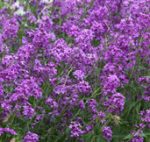 Dames rocket is a biennial or short-lived perennial known by a variety of names including dame’s violet, mother of the evening, and sweet rocket. It is a member of the mustard family, Brassicaceae, that also includes broccoli, stock, and candytuft. Introduced from Eurasia into North America by early European settlers in the 17th century as an ornamental, dame’s rocket escaped cultivation and has become invasive in open woodlands, prairies, roadsides, ditches and other disturbed areas in most of North America to North Carolina, Arkansas, and California. The plants grow from a taproot with coarse secondary roots and produce a rosette of leaves the first year. In the second year plants grow 1-3′ tall and have sparingly branched hairy stems carrying 6′ long lanceolate leaves with dentate margins. From spring to mid summer, white to pink and lavender flowers appear in loose terminal racemes 6-18″ long. Each 4 petaled flower is 3/4-1″ across and very fragrant especially in the evening. In fall, long dry seed pods appear bearing several seeds and a single plant can produce up to 20,000 seeds in a season. Although the flowers are very attractive and often included in wildflower seed mixes the invasive nature of the plant should deter its use in the garden. The genus name, Hesperis, comes from the Greek word hespera meaning evening and refers to the fragrance that is prominent in the evening. The specific epithet, matronalis, is the Latin word meaning relating to a married woman and was the name of the holiday of Roman matrons on March 1 honoring Juno, the patron goddess of childbirth.
Dames rocket is a biennial or short-lived perennial known by a variety of names including dame’s violet, mother of the evening, and sweet rocket. It is a member of the mustard family, Brassicaceae, that also includes broccoli, stock, and candytuft. Introduced from Eurasia into North America by early European settlers in the 17th century as an ornamental, dame’s rocket escaped cultivation and has become invasive in open woodlands, prairies, roadsides, ditches and other disturbed areas in most of North America to North Carolina, Arkansas, and California. The plants grow from a taproot with coarse secondary roots and produce a rosette of leaves the first year. In the second year plants grow 1-3′ tall and have sparingly branched hairy stems carrying 6′ long lanceolate leaves with dentate margins. From spring to mid summer, white to pink and lavender flowers appear in loose terminal racemes 6-18″ long. Each 4 petaled flower is 3/4-1″ across and very fragrant especially in the evening. In fall, long dry seed pods appear bearing several seeds and a single plant can produce up to 20,000 seeds in a season. Although the flowers are very attractive and often included in wildflower seed mixes the invasive nature of the plant should deter its use in the garden. The genus name, Hesperis, comes from the Greek word hespera meaning evening and refers to the fragrance that is prominent in the evening. The specific epithet, matronalis, is the Latin word meaning relating to a married woman and was the name of the holiday of Roman matrons on March 1 honoring Juno, the patron goddess of childbirth.
Type: Biennial or short-lived herbaceous perennial
Bloom: Loose terminal racemes of white to lavender flowers from spring to mid summer
Size: 1-3′ H x 1-2′ W
Light: Full sun to partial shade
Soil: Average, medium moist, well-drained
Hardiness: Zones 3-8
Care: Cut back for rebloom
Pests and Diseases: None of significance
Propagation: Seed, cuttings, division
Companion Plants: Bee balm, speedwell, columbine, common foxglove
Outstanding Selections:
var. albiflora ‘Alba Plena (white double flowers)
‘Lilacina Flore Pleno’ (double lilac flowers)
‘Pururea Pleno’ (double purple flowers)